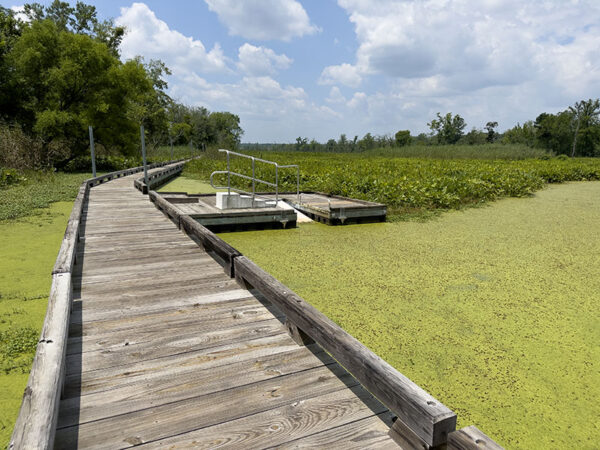Description
The park entrance road follows along the shoreline of Aikens Swamp where two observation platforms and a boardwalk provide easy wildlife viewing. From late fall through late winter, visitors can observe a diversity of waterfowl such as northern shovelers, ring-necks, gadwalls, widgeons and blue-winged teals. In early spring, the songs of chorus frogs, spring peepers, cricket frogs, and American toads erupt from the swamp. Green and gray tree frogs follow the chorus into summer. Early spring brings osprey and yellow and prothonotary warblers. Rare sightings include the least bittern and gallinule. Throughout the year, visitors can view bald eagles, barred owls and red-shouldered hawks. Common mammal sightings include muskrats and beavers. Rarer sightings include river otter and mink. Snapping, painted, mud and spotted turtles can be viewed as well.

Use the accessible canoe/kayak launch to explore Aikens Swamp and look for long-legged waders, waterfowl, turtles, and amphibians. Photo Credit: Lisa Mease/DWR
Visitors can also hike or bike the Dutch Gap Trail that starts next to the Henricus Visitor Center. The first half-mile takes visitors along a tidal wetlands and meadow. American goldfinches, eastern bluebirds, blue grosbeaks, eastern phoebes and sparrow hawks can be observed in the meadow and along the fence line. Many aquatic species such as kingfishers, great blue herons and great egrets can be observed in the wetlands.
At the half-mile post, the trail splits to form a 3.5-mile circuit trail that circumnavigates the entire Tidal Lagoon. Many other aquatic species, such as gulls, terns, cormorants, and red-wing blackbirds, can be observed in the Tidal Lagoon. Between mileposts 3.4 and 3.5, a heron rookery can easily be observed in the tidal lagoon before the trees leaf out. Ospreys are common from spring through summer, and bald eagles can be observed year-round.
Almost the entire section of the 3.5-mile circuit passes through a bottomland forest where turkey and white-tailed deer forage. During the summer, tiger swallowtail, spicebush swallowtail and silver-spotted skippers can be viewed. Zebra swallowtails can be seen around the patches of pawpaw. Dragonfly species such as eastern pondhawks, common whitetails, golden-winged skimmers and eastern amberwings can been seen throughout the summer and early fall.
A 2.5 mile tidal lagoon water trail allows exploration by kayak or canoe. From here, wetlands, islands, and a heron rookery may be observed. A map of the lagoon water trail is available on the park’s website. Additionally, individuals and groups can schedule a private kayak/canoe tour in the tidal lagoon. Contact the park for details.
Notes:
- Access to some parking areas and trails may be limited due to construction.
Wildlife Sightings
230 species have been reported at this site to date.
Birds Recently Seen at Henricus Park/Dutch Gap Conservation Area:
- Canada Goose
- Northern Shoveler
- Gadwall
- American Wigeon
- Mallard
- Ring-necked Duck
- Bufflehead
- Hooded Merganser
- American Coot
- Pied-billed Grebe
Recent Checklists:
| Date | # of Species | Submitted By |
|---|---|---|
| 21 Feb 2026 | 26 | Henry Nase |
| 21 Feb 2026 | 8 | Kody Mason |
| 20 Feb 2026 | 42 | Kathy Carpenter |
| 18 Feb 2026 | 23 | JB McNamee |
| 18 Feb 2026 | 39 | Alan Wingfield |
Amenities & Accessibility
Amenities
- On-site Parking
- Restrooms
- Kayak/Canoe Launch
- Birdability Report Available
- No Fee or Permit/Pass Requirement
Other Amenities: Bike Trails, Hiking Trails, Interpretive Program/Events, Viewing Blinds, Visitor/Nature Center, Historical Site
Accessibility Considerations

This location has a Birdability Site Review available
Learn more about Birdability’s efforts to map accessible outdoor spaces
Maps & Directions
Physical Address: 251 Henricus Park Road, Chester, VA 23836
From I-95, take the exit for VA-10 East/W Hundred Road, turn left onto Old Stage Road, turn right onto Coxendale Road, turn right onto Henricus Park Road, and follow it to the parking area for Henricus Historical Park.
Site Information
Managed By:
- Chesterfield County
Access Requirements:
- Daily, 8 a.m. - sunset
Contact Information:
- Chesterfield County Naturalist: 804-748-1623, battistam@chesterfield.gov
- Visit Website
Sites, or portions of sites, can be closed periodically for management activities. Please always check the site’s website for additional information prior to visiting.


